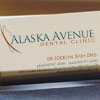Dental emergencies happen to many people, often resulting from an injury or an underlying oral health condition. Our Fort St. John dentists share advice on how to know if your dental issue is an emergency, and what to do.
What is a dental emergency?
Any problem with your teeth, mouth or gums that requires urgent dental treatment is a dental emergency. The following situations are all considered to be dental emergencies:
Broken, Chipped, or Knocked Out Tooth
A broken or chipped tooth can usually be repaired, but will require urgent dental care. The dentist may be able to repair the fracture or chip with a filling, whereas more serious breaks may need a crown or root canal.
For teeth that have been knocked out, a dentist may be able to put the tooth back in place within approximately an hour of the incident. The tooth has a better chance of taking root again within this time frame. After the two-hour mark, the chances decreases significantly, and alternative measures will have to be considered.
Severe Toothache
If you experience a toothache you cannot manage with over-the-counter pain medication, first apply ice to the area and contact your dentist as soon as possible, as this is considered a dental emergency.
Toothaches can indicate potential major dental issues, and so it is important to take them seriously.
Lost Filling
A lost filling is also serious as it exposes the interior of your tooth, weakening its structure. It’s important to see a dentist to have the filling replaced as soon as possible. You can protect the area until you get to the dentist by replacing the filling temporarily with a softened piece of sugarless gum.
Object Lodged Between Teeth
Objects getting lodged between the teeth can present a hazard and warrant urgent attention from your dentist. If you cannot dislodge the object with floss, do not use a sharp object to attempt to remove it yourself as this could push it further between your teeth - or injure your gums.
Bleeding From a Badly Bitten Tongue or Lip
If you are experiencing bleeding that can’t be quelled after biting your tongue or lip, you need to visit an emergency dental clinic. In the meantime, apply a clean cloth to the part of the mouth that’s bleeding and press down. Use an ice pack to reduce swelling, and look for urgent dental care.
Painful Dental Abscess
A dental abscess is a buildup of pus which forms inside the teeth or gums. This very painful condition usually develops from a bacterial infection, often within the soft pulp of the tooth or the root of the tooth. They can be caused by a cavity that’s been left untreated, severe gum disease or perhaps a chipped tooth.
Symptoms can include anything from a bad taste in your mouth to swollen glands, pain, pus or a fever. An abscessed tooth will usually need surgery to drain the infection and treat it properly. Treatment for dental abscesses can involve root canal surgery.

